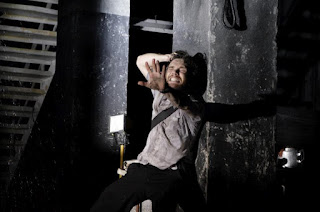'Misterman' review or 'Do you think these plastic wings will hold me?'
'Misterman',
Enda Walsh
Lyttleton
Theatre, 18th April 2012
Written
for Culture Wars
Anyone
who complains that theatre is an elitist, rarefied or even downright
dull genre, should go see Enda Walsh's, 'Misterman', and blush in
shame. This madcap, one-man show is heart-pounding stuff and
generates the type of thumping excitement that only theatre can
muster. If Enda Walsh's, 'Disco Pigs', first introduced us to
Cillian Murphy's acting talents, then 'Misterman' shows us Murphy at
the absolute height of his powers. And, christ, does he reach
heavenly heights with this blisteringly fierce performance.
You'd
think the Cottlesloe would've been the natural, National location for
a one-man show but Walsh's play, and Murphy's performance, easily
fills the yawning Lyttleton stage. Jamie Barton's set resembles an
abandoned warehouse, which feels empty – darkness shrouding its
great depth – but is also littered with props. Tape recorders are
strewn everywhere and their presence reminds us of one of Walsh's
principal sources of inspiration, Beckett. Indeed, there's a raised
platform with an isolated tape recorder, that could've been pulled
straight from 'Krapp's Last Tape'. But, surrounding this platform,
are gaping shadows and a whole lot of crazy. This is Beckett but
without the consummate restraint: it's freer, darker and much more
wild.
It
is this creaking warehouse that Thomas Magill (Murphy) now calls
home. Whether this warehouse is real or metaphorical is anyone's
guess but it's all Magill has left. He once lived in a quaint, rural
Irish town – Inishfree – but has since fled. Assisted by a stream
of recordings and his own, volatile, narrative, Magill remembers the
events that led him to this desolate, isolation.
Tirelessly
and dogmatically, Thomas Magill re-enacts that fateful day, which
forced him to leave his home, his mother and his dad's graveyard.
With dazzling skill and incredible speed, Murphy packs the stage with
the colourful citizens of Inishfree. At first, Murphy's righteous
Magill sees only minor faults in his neighbours, as he duly notes
down their sins in his little red book. But as the day wears on –
and on and on – the citizens grow more obscure and grotesque. They
start to blaze red, horns all but poking from their proud, empty
heads. Magill discovers that his only ally – and potential recruit
to his religious crusade – actually likes to leer at sexy
calendars. He realises that a friendly cafe-owner is really a dirty
whore and that even angels have devillish insides.
As
these sins begin to overshadow even the saintliest of citizens, the
warehouse starts to shudder and flicker, mimicking Magill's confusion
and anger. Rain pours from the ceiling. Odd little crucifixes flash
up, initially comforting but quickly threatening. Thunder rumbles,
lightning flashes and music, outside of Magill's control, envelops
everything. The effects grow bigger, madder and wilder, as Magill
loses his grip on his story and his sanity.
Enda
Walsh directs this play, which is perhaps why the stage actions and
Magill's emotional rhythms, are so perfectly in synch. This
unravelling finally unleashes with an awesome final scene, which sees
Magill attend a community dance. The stage effects run riot, no
longer governed by a lost and broken Magill. A massive crystal ball
starts spinning, its shards of light piercing the audience. Thumping
music – so unlike the soothing choral music that accompanies
Magill's reflective, spiritual moments – all but punches Magill in
the face, with its cold force. Even the microphone, which Magill
clutches in his hand, wrestles out of his reach. He bellows and
whispers at the stunned crowd – us – as the microphone dances
about his mouth. Everything is turning against Magill and, as plastic
wings sprout out of his back, it feels like they're mocking him, with
their flimsy promise of flight and faith.



Comments
Post a Comment